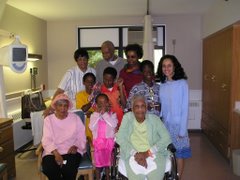

What You Need To Know BEFORE Your Aging Loved One Leaves the Hospital or Nursing Home
§ Was your loved one admitted to the hospital for an acute or chronic condition such as a stroke, hip fracture, respiratory problem or a blood clot?
§ Are you nervous because you don’t know how to care for them when they return home?
§ Are you intimidated by the complex world of medical care?
The following tips may help guide you in being the best caregiver when your loved one comes home.
Develop a Good Relationship with the Staff.
The first person you will likely meet will be the attending nurse. She and her peers play a critical role in assuring your loved one’s needs are met. When they match your friendly face with their patient, they are more likely to give special care. And that's precisely what you want to happen. Bond with nurses and nurse’s aids on all shifts. Bring them flowers, chocolates, or other tokens of appreciation.
Encourage thorough and open lines of communication with your Mom’s primary physician.
Come prepared with a specific list of questions to ask about your Dad's condition. Shake off your fears and don’t allow yourself to feel intimidated. Listen carefully, take notes, and ask them how you can contact them directly should you have additional questions. Always, obtain complete written instructions from the doctor. Finally, thank him/her profusely for all their hard work.
Another key member of the team is the hospital’s or nursing home’s social worker/discharge nurse. Meet them the first day. Ensure they know you are taking an active role in your loved one's care and looking to them to give you expert advice on a caregiving plan after discharge. Learn from them what homecare benefits are available, what a follow-up plans should be, and if physical therapy is needed. Take advantage of their knowledge of community resources from local and state institutions.
Never let them rush you out of the facility until you are confident you understand the appropriate next steps in caring for your loved one.
The hospital or nursing home social worker can be one of your greatest resources.Be gracious to everyone you encounter, including employees who bring meal trays, employees who mop, and employees who repair the toilet.
Know What Resources Are Available after Discharge (equipment and services).
Many services are at your disposal for your loved one once they are released from the facility. Generally, Medicare pays for most skilled care (doctors, nurses, and specialists), therapy (physical and speech), home health services, medical supplies and equipment such as wheelchairs and mobile commodes, personal care by home health aides (bathing, meal preparation). Medicare coverage varies by state so check your state’s coverage.Don’t take your loved one home until all follow-up homecare products and services have been ordered.Have prescriptions filled before you leave. Bring home sample packets of several days supply. Be sure to ask questions about possible drug interaction issues.
Arrange for a transportation in an ambulance or medical van if you are unable to transport the patient yourself.
Take an Active Role to Learn Daily Care Routines.
Spend at least two full days (review your employers FMLA policy) in the facility to observe all routines including physical therapy, wound care, and medicine management. Become a part of the care team, and even assist with grooming and feeding to familiarize yourself with your loved one’s level of need.
This experience will be invaluable in helping you to learn how to provide care for your loved one.
In working with nurses and nurses and aides, you may even identify someone you would like to hire privately to help out at home. Many nurses and nurses’ aides contract their services after hours to other patients. This could save you significant time and money in selecting and interviewing in-home health care workers.
Understand the Bill.
If possible, at the end of each day, review your loved one’s tab. Assert yourself with the medical staff and the accounting staff to clarify any line items you don't understand. Although you may feel uncomfortable challenging certain expenses, you will benefit from speaking out while you have leverage--while your loved one is still a patient. Don't wait until after they've been discharged to question the invoices.
Consult Families of Other Patients for Information.
Many family caregivers are very skilled at caring for their loved ones and have lots of knowledge and experience with the system. Don't be afraid to ask what they're doing and how they are achieving it. Remember, nothing ventured, nothing gained.
§ Was your loved one admitted to the hospital for an acute or chronic condition such as a stroke, hip fracture, respiratory problem or a blood clot?
§ Are you nervous because you don’t know how to care for them when they return home?
§ Are you intimidated by the complex world of medical care?
The following tips may help guide you in being the best caregiver when your loved one comes home.
Develop a Good Relationship with the Staff.
The first person you will likely meet will be the attending nurse. She and her peers play a critical role in assuring your loved one’s needs are met. When they match your friendly face with their patient, they are more likely to give special care. And that's precisely what you want to happen. Bond with nurses and nurse’s aids on all shifts. Bring them flowers, chocolates, or other tokens of appreciation.
Encourage thorough and open lines of communication with your Mom’s primary physician.
Come prepared with a specific list of questions to ask about your Dad's condition. Shake off your fears and don’t allow yourself to feel intimidated. Listen carefully, take notes, and ask them how you can contact them directly should you have additional questions. Always, obtain complete written instructions from the doctor. Finally, thank him/her profusely for all their hard work.
Another key member of the team is the hospital’s or nursing home’s social worker/discharge nurse. Meet them the first day. Ensure they know you are taking an active role in your loved one's care and looking to them to give you expert advice on a caregiving plan after discharge. Learn from them what homecare benefits are available, what a follow-up plans should be, and if physical therapy is needed. Take advantage of their knowledge of community resources from local and state institutions.
Never let them rush you out of the facility until you are confident you understand the appropriate next steps in caring for your loved one.
The hospital or nursing home social worker can be one of your greatest resources.Be gracious to everyone you encounter, including employees who bring meal trays, employees who mop, and employees who repair the toilet.
Know What Resources Are Available after Discharge (equipment and services).
Many services are at your disposal for your loved one once they are released from the facility. Generally, Medicare pays for most skilled care (doctors, nurses, and specialists), therapy (physical and speech), home health services, medical supplies and equipment such as wheelchairs and mobile commodes, personal care by home health aides (bathing, meal preparation). Medicare coverage varies by state so check your state’s coverage.Don’t take your loved one home until all follow-up homecare products and services have been ordered.Have prescriptions filled before you leave. Bring home sample packets of several days supply. Be sure to ask questions about possible drug interaction issues.
Arrange for a transportation in an ambulance or medical van if you are unable to transport the patient yourself.
Take an Active Role to Learn Daily Care Routines.
Spend at least two full days (review your employers FMLA policy) in the facility to observe all routines including physical therapy, wound care, and medicine management. Become a part of the care team, and even assist with grooming and feeding to familiarize yourself with your loved one’s level of need.
This experience will be invaluable in helping you to learn how to provide care for your loved one.
In working with nurses and nurses and aides, you may even identify someone you would like to hire privately to help out at home. Many nurses and nurses’ aides contract their services after hours to other patients. This could save you significant time and money in selecting and interviewing in-home health care workers.
Understand the Bill.
If possible, at the end of each day, review your loved one’s tab. Assert yourself with the medical staff and the accounting staff to clarify any line items you don't understand. Although you may feel uncomfortable challenging certain expenses, you will benefit from speaking out while you have leverage--while your loved one is still a patient. Don't wait until after they've been discharged to question the invoices.
Consult Families of Other Patients for Information.
Many family caregivers are very skilled at caring for their loved ones and have lots of knowledge and experience with the system. Don't be afraid to ask what they're doing and how they are achieving it. Remember, nothing ventured, nothing gained.











.jpg)
No comments:
Post a Comment